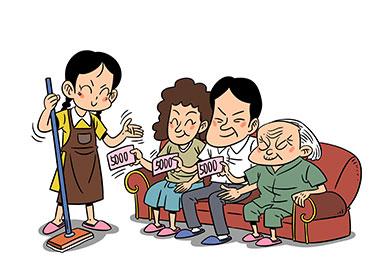• “What if the elderly members of the family pass away? The younger generation might lose their ability to support themselves. They cannot become ‘full-time children’ for other families.”
• “Who is sponging, exactly? As many other children work in big cities and leave their parents alone at home, ‘full-time children’ keep their parents company and take care of them every day. The former may have well-paid jobs, but they might eat up their parents’ savings when they want to get married and buy an apartment in big cities like Beijing and Shanghai.”
• “It’s the parents who are sponging off their children. They have trapped their children and give little consideration to their future.”
Leye Lehuo,a video website for job seekers: “Full-time children are actually a product of the economic slowdown. It indicates that young graduates would rather stay jobless than join in the fierce competition of the labor market... It is OK that we give young people a window to ease their pressures.”
Dazhong Daily, newspaper in Shandong Province: “Though not in the competitive workplace, ‘full-time children’ will still feel anxiety over being jobless. In short, no ship can stay moored in harbor... ‘Full time children’ may be a temporary way for young people to change gears, but it should never be for the long term.”
Yizhi Xuetang, a WeChat account covering education: “The full-time children phenomenon shows that our supply of university graduates has exceeded demand and that families and schools have failed to teach children how to plan their careers.
As the economic slowdown makes it increasingly harder for university graduates to find a satisfactory job, some have turned to their parents and grandparents for paid work. The phenomenon, dubbed “full-time children” by netizens, involves young people staying at home to help with housework and care for their elderly relatives, who in turn pay them with a portion of their pensions.
“I now serve as the family’s housekeeper and caregiver, cleaning the house, cooking and taking care of three people,” a university graduate posted of her experience on short-video platform Red. “They pay me 5,000 yuan (US$735) a month,” she said, adding the three relatives, her father, mother and grandmother, receive a combined monthly pension of 18,000 yuan (US$2,613).
According to the graduate, her relatives prefer that she work as their caregiver than find a job, given the current potential for low wages and long hours.
The post sparked heated discussions among Chinese netizens, with many expressing envy toward the young woman’s family for being wealthy enough to employ her. Besides a steady paycheck, some unemployed netizens cited workplace competition and social interaction with colleagues as what they desired most from a job.
China’s Ministry of Education predicts the country will see around 11.6 million university graduates in 2023, an increase of 820,000 compared to 2022. A survey by popular job-seeking website 51job.com showed that 13.3 percent of respondents identified as “full-time children.”
Critics argue this is merely a way for adult children to sponge off their parents, which wastes family and social resources and weakens their ability to contribute to society. However, supporters maintain that caring for family is a legitimate job and people have the right to choose a lifestyle that suits them.

 Old Version
Old Version